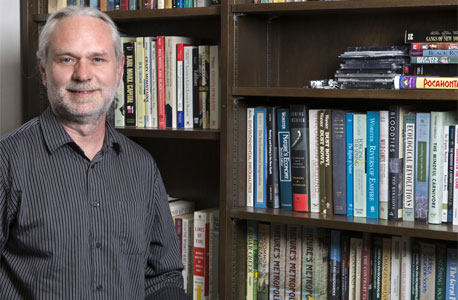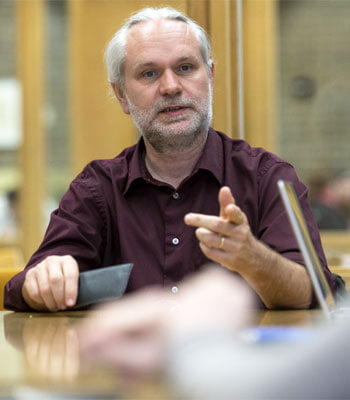Jim Schmidt wants students awake and engaged in his classroom. The lights stay on. The PowerPoint remains off. Napping and smartphone surfing are unacceptable.
But Schmidt also wants students to laugh and enjoy their education.
“If serious intellectual pursuit is the overarching idea, that does not mean we can’t have fun while doing it. I want students to know that it’s OK to laugh – about the past, about me, about themselves,” Schmidt says. “I have always been a bit of the ‘class clown,’ and I bring that to the classroom.”
Schmidt, chair of the Department of History, calls his philosophy “relaxed seriousness.” It’s not an ideology of teaching, he says, but of learning.
Learners are expected to arrive prepared – and “they usually do,” Schmidt says – to chat and write about the required reading. Good humor helps.
“As a teacher in a humanities discipline, I long ago abandoned the didactic lecture method. I often tell my students that such a mode of information delivery has been obsolete since the invention of the printing press, and I’m not joking,” he says.
“Talking about ideas articulately in a public setting is just as important, if not more so, than writing about them in largely private exchanges between students and teachers,” he adds. “A discussion-based course, in my view, is not an encounter group. It’s a place to pursue serious intellectual activity, a place to consider hard questions that often do not admit of easy answers.”
What does “discussion” mean?
“It means making sure to call on the shy student who raises his or her hand only occasionally. It means attention to a diversity of student voices,” Schmidt says. “It also means allowing, even encouraging, students to take risks in what they say in class, so long as they are respectful of others. In other words, I care less that they ‘get the right answer’ and more that they ‘think out loud.’ ”
Former doctoral student Melissa Hayes, now a Ph.D.-minted instructor in the History Department at Southern New Hampshire University, is a believer.
Schmidt “has a knack for eliciting robust and thoughtful participation,” says Hayes, who also served as his teaching assistant.
“It takes considerable finesse to draw out broad-based participation in large classes and in such a way that students are consistently motivated to think more deeply about the topic at hand,” she says. “Schmidt’s graduate courses are equally as stimulating. I have never been as inspired to question what I think I know.”
Schmidt earned his Ph.D. from Rice University in 1992 and joined NIU a year later.
Colleagues are moved by his “insistence on explicit discussion of pedagogy, meaningful assessment and improving the classroom experience,” former chair Beatrix Hoffman says.
That crusade, Hoffman adds, helped the research-intensive department “become a center of teaching innovation and excellence.”
“Dr. Schmidt has been at the heart of this incredibly positive change,” she says. “(He) does not assign a textbook, and he refuses to lecture or use PowerPoint. His students do not passively absorb material. Instead, they learn and practice the skills involved in ‘doing history.’ ”
His ban on technology applies only to the classroom: Hoffman calls Schmidt “a strong advocate in persuading our library to purchase and make available hundreds of digital primary documents for students to use in their research.”
“Outside the classroom, digitization has been a boon for students, who can now pursue an infinite universe of real research questions,” Schmidt confirms.
But “real learning requires doing real things,” he adds. “No amount of PowerPointing can replace reading, writing, talking and thinking. University education is about the exchange of ideas.”


